Every year, Jews all over the world celebrate Pesach, or Passover. Families and friends gather to share the Haggadah at their seder table. It’s a time of traditions, each as unique as the next.
I grew up in Los Angeles, watching my parents prepare for Passover by setting up the long tables in the living room, breaking out the fancy dishes, and getting out the haggadot. We would rent tables and chairs, and the living room transformed into what felt like this huge dining hall. My family got into the same kind of rhythm every year: my dad would do the cooking while my mom, sister and I would set up the tables.
As the youngest in my family, I had to read The Four Questions – something I dreaded doing. I did not want to read (or even talk) in front of a large group of people. Of course when younger family members were eventually old enough to participate in seder and it was their turn to read The Four Questions, that’s when I became comfortable enough to read them.
When I realized that this year would be my first Passover away from home, it got me thinking about what my Passovers at home have been like. We read the same Four Questions every year– but this year, there’s another set of Four Questions on my mind: The Four Questions About My Family’s Seder, and what makes it so special.
Why So Many Seder Plates?
My mom has a rather large collection of seder plates. No two are alike. They line the long tables and everyone was able to see a seder plate for themselves. There was not just the one at the head of the table; no matter where you sit at my family’s seder, you have access to a seder plate. That’s why there were so many seder plates.
Why is this Haggadah different from all others?
My mother makes notes in her haggadah about who should read what, which pages we would skip, which songs we would sing – everything! I always thought it was the coolest thing. It was as if she had the “answer key.” As I got older and my curiosity grew, I found myself more interested in the haggadah preparation. I began to sit with my mom and actually go through the service with her as she wrote her notes in the margins.
We used the same haggadot every year. The “answer key” that my mom used began to look like a history book as names written in the margins would change from year to year. Some people read the same sections every year. Some section readers changed as they got older and were able to read more. The transformation was very unique to watch.
What Really Makes a Seder Special?
It is definitely a new feeling not being home for Passover. But that does not mean my Passover will be any less special. What makes a seder special is something that is experienced at any seder you attend: We learn about the Israelites’ experience as they made their way from one place to another. We get to celebrate freedom. We are able to look at our lives as Jews today and feel grateful for what we have now– while being reminded that there is still work to do, for so many.
How Will I Celebrate Passover, Away From My Family’s And All Of Our Traditions?
Although I do not share the feeling of “freedom” with the Israelites, I do feel the sense of Exodus as I have traveled from Los Angeles and will now be experiencing Passover in Jackson, Mississippi. I will be able to experience and hear all about Passover traditions in the south through my work with the ISJL. This year, I will not be experiencing the “hustle and bustle” of preparing for seder at my house. I will be in Jackson, continuing to enjoy my time here. I know that the experience I had growing up will not be the one I will have for the rest of my life.
One day I may lead the seder at my own house. I may start new traditions – some based on how I grew up… and others completely new. There are definitely more questions ahead!



